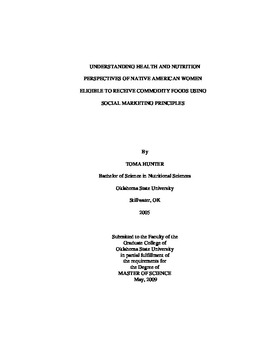| dc.contributor.advisor | Parker, Stephany | |
| dc.contributor.author | Hunter, Toma | |
| dc.date.accessioned | 2014-04-15T22:01:13Z | |
| dc.date.available | 2014-04-15T22:01:13Z | |
| dc.date.issued | 2009-05-01 | |
| dc.identifier.uri | https://hdl.handle.net/11244/9234 | |
| dc.description.abstract | Native Americans experience a disproportionate rate of many chronic diseases as compared to the general United States population. Inadequate formative assessment and lack of attention to cultural relevancy in program planning and development may contribute to health disparities among Native Americans. The aim of the current study was to conduct a formative assessment to identify Native American women's perspectives of health and nutrition using a social marketing approach. Native American women living within the Indian Nation within the specified jurisdictional territory under study and eligible to receive food stamp or commodity food benefits participated in focus group discussions. A semi-structured focus group script was developed using social marketing principles of product, promotion, price and place. The focus group script was reviewed by multiple levels of influence to address face validity. Twelve focus groups were conducted in community locations and discussions were recorded digitally. Verbatim transcripts of digital recordings were developed by the Bureau of Social Research at Oklahoma State University. Trained researchers identified common themes framed using social marketing principles. The major theme identified for health product was diabetes prevention. The experience of diabetes was a cultural norm for this group as participants shared personal, family and peer experiences with the disease. In terms of health promotion, participants indicated a preference for interactive education with an intergenerational focus. The identification of elders as agents of change was common among participants. Participants most frequently identified Indian Nation within specified jurisdictional territory specific locations as preferred sites for program delivery. In general, the price for lack of attention to Native American values when designing health programs is lack of adherence to advice from health professionals. Results from the formative assessment will be used to develop a social marketing campaign specific to Native American families living within the Indian Nation within the specified jurisdictional territory and can be used by extension and health professionals as a guide for planning future research with Native Americans. Findings from the study implicate a need for formative assessment and attention to culture when planning and developing nutrition and health education programs for Native Americans. | |
| dc.format | application/pdf | |
| dc.language | en_US | |
| dc.publisher | Oklahoma State University | |
| dc.rights | Copyright is held by the author who has granted the Oklahoma State University Library the non-exclusive right to share this material in its institutional repository. Contact Digital Library Services at lib-dls@okstate.edu or 405-744-9161 for the permission policy on the use, reproduction or distribution of this material. | |
| dc.title | Understanding Health and Nutrition Perspectives of Native American Women Eligible to Receive Commodity Foods Using Social Marketing Principles | |
| dc.type | text | |
| dc.contributor.committeeMember | Hermann, Janice | |
| dc.contributor.committeeMember | VanDelinder, Jean | |
| osu.filename | Hunter_okstate_0664M_10171.pdf | |
| osu.college | Human Environmental Sciences | |
| osu.accesstype | Open Access | |
| dc.description.department | Department of Nutritional Sciences | |
| dc.type.genre | Thesis | |
